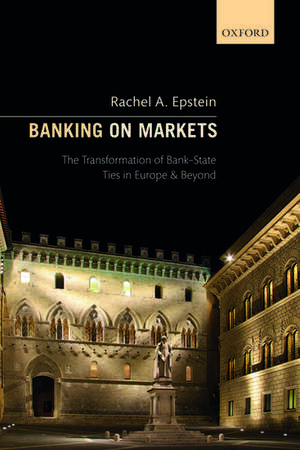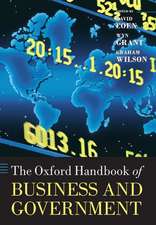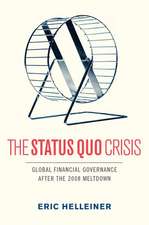Banking on Markets: The Transformation of Bank-State Ties in Europe and Beyond
Autor Rachel A. Epsteinen Limba Engleză Paperback – 11 noi 2019
| Toate formatele și edițiile | Preț | Express |
|---|---|---|
| Paperback (1) | 178.93 lei 31-37 zile | |
| OUP OXFORD – 11 noi 2019 | 178.93 lei 31-37 zile | |
| Hardback (1) | 522.45 lei 31-37 zile | |
| OUP OXFORD – 24 aug 2017 | 522.45 lei 31-37 zile |
Preț: 178.93 lei
Preț vechi: 232.59 lei
-23% Nou
Puncte Express: 268
Preț estimativ în valută:
34.25€ • 37.21$ • 28.79£
34.25€ • 37.21$ • 28.79£
Carte tipărită la comandă
Livrare economică 10-16 aprilie
Preluare comenzi: 021 569.72.76
Specificații
ISBN-13: 9780198849698
ISBN-10: 0198849699
Pagini: 240
Dimensiuni: 154 x 232 x 13 mm
Greutate: 0.35 kg
Editura: OUP OXFORD
Colecția OUP Oxford
Locul publicării:Oxford, United Kingdom
ISBN-10: 0198849699
Pagini: 240
Dimensiuni: 154 x 232 x 13 mm
Greutate: 0.35 kg
Editura: OUP OXFORD
Colecția OUP Oxford
Locul publicării:Oxford, United Kingdom
Recenzii
...this is an important book, which offers a novel, rich and multi-faceted account of the transformation of the ties between states and banks in Europe.
Epstein has produced an accessible and comprehensive guide to the structural forces that have directed the evolution of this very important stabilizing transformation.
Fascinating study of how the recent economic and financial crisis unfolded in the countries of Central and Eastern Europe. ... It is still too early to tell whether Western European governments will find themselves as estranged from their home-grown financial institutions as are the governments of Central and Eastern Europe. What is clear is that the old relationship between states and banks deserves careful reconsideration. Epstein's book is a critical first step in that direction.
Professor Epstein has written a highly engaging and accessible account of the changing power dynamics between states and markets, in both eastern and western Europe. She convincingly debunks a number of widespread misconceptions about the political and economic implications of foreign bank ownership. Although focused on the political economy of banking in a European context, this is a work that is bound to become a classic and should be read by all students of political economy.
The globalization of finance around the world has transformed the way money is borrowed, debts managed, and economic risks navigated. Banking on Markets offers a much needed exploration of the foreign penetration of formerly insulated banking sectors in Eastern Europe, with surprising findings about the relative robustness this has produced in dealing with the Eurozone crisis. A very helpful guide to a complex set of issues facing the EU, and beyond.
Banking on Markets brilliantly analyses how the USSR's collapse, European monetary union, and the 2008 global financial crisis have fundamentally transformed bank-state relations in Europe. Through careful argumentation and compelling evidence, Epstein demonstrates that this intensely political process has empowered market actors and made the European banking system more resilient, while at the same time reducing the ability of governments in the poorer European states to use their national banks as development tools to help them catch up with the rest of Europe. Banking on Markets raises challenging questions, provides often unsettling answers, and should be read by everyone concerned with the future of banking and finance in Europe.
Epstein has produced an accessible and comprehensive guide to the structural forces that have directed the evolution of this very important stabilizing transformation.
Fascinating study of how the recent economic and financial crisis unfolded in the countries of Central and Eastern Europe. ... It is still too early to tell whether Western European governments will find themselves as estranged from their home-grown financial institutions as are the governments of Central and Eastern Europe. What is clear is that the old relationship between states and banks deserves careful reconsideration. Epstein's book is a critical first step in that direction.
Professor Epstein has written a highly engaging and accessible account of the changing power dynamics between states and markets, in both eastern and western Europe. She convincingly debunks a number of widespread misconceptions about the political and economic implications of foreign bank ownership. Although focused on the political economy of banking in a European context, this is a work that is bound to become a classic and should be read by all students of political economy.
The globalization of finance around the world has transformed the way money is borrowed, debts managed, and economic risks navigated. Banking on Markets offers a much needed exploration of the foreign penetration of formerly insulated banking sectors in Eastern Europe, with surprising findings about the relative robustness this has produced in dealing with the Eurozone crisis. A very helpful guide to a complex set of issues facing the EU, and beyond.
Banking on Markets brilliantly analyses how the USSR's collapse, European monetary union, and the 2008 global financial crisis have fundamentally transformed bank-state relations in Europe. Through careful argumentation and compelling evidence, Epstein demonstrates that this intensely political process has empowered market actors and made the European banking system more resilient, while at the same time reducing the ability of governments in the poorer European states to use their national banks as development tools to help them catch up with the rest of Europe. Banking on Markets raises challenging questions, provides often unsettling answers, and should be read by everyone concerned with the future of banking and finance in Europe.
Notă biografică
Rachel A. Epstein is Professor of International Relations and European Politics at the Josef Korbel School of International Studies, University of Denver. Her publications include In Pursuit of Liberalism: International Institutions in Postcommunist Europe (Johns Hopkins 2008), and also edited a special issue of the Review of International Political Economy entitled 'Assets or Liabilities? Banks and the Politics of Foreign Ownership versus National Control' (2014). Her research and teaching examine the relationship between economic trends and national security outcomes, the dynamics of postcommunist transition, the role of international organizations in global politics, and economic crises and financial reform.


















